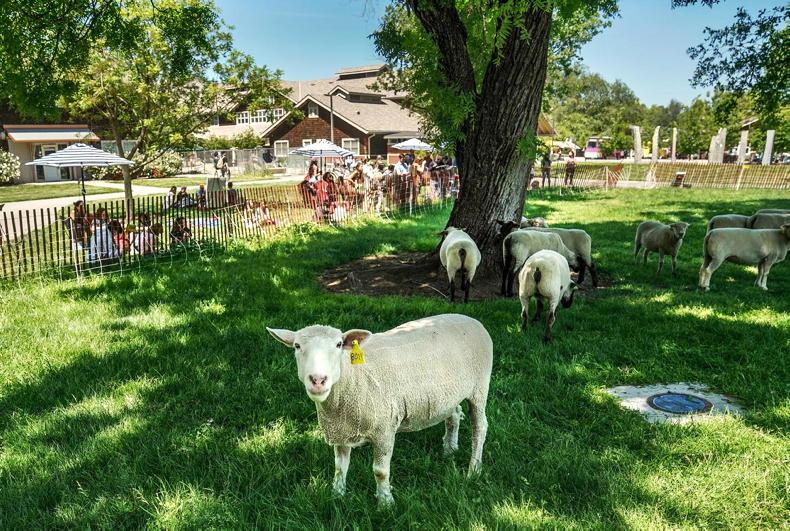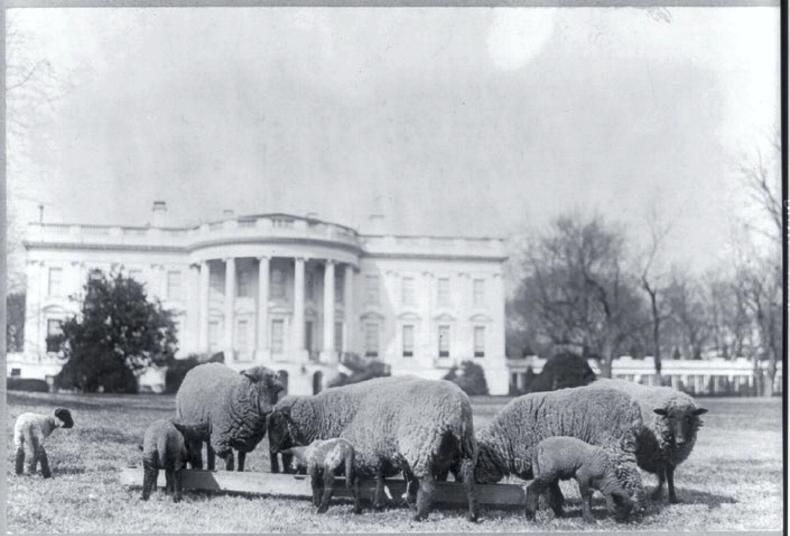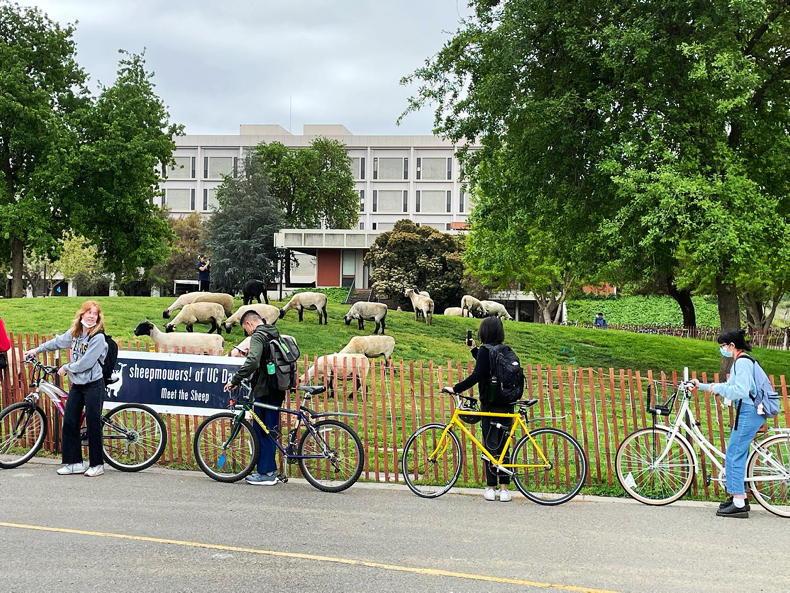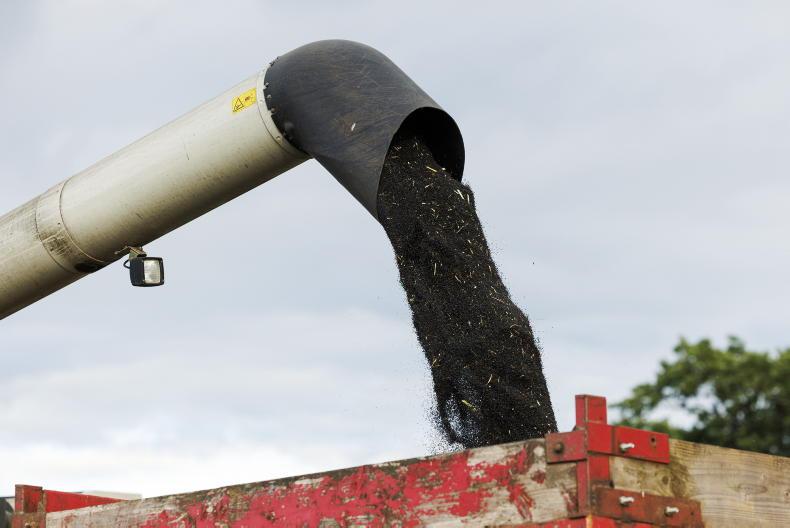Sheep can benefit the ecosystems of urban lawns and improve the mental health and wellbeing of the people that surround them, a US study has found.
Researchers at University of California, Davis (UC Davis), found that the college’s flock of 25 sheep fertilised the soils of the grassland between campus buildings and managed vegetation growth without the need for excessive mowing and sprays.
They also found that the mood of students on the campus was lifted by the sheep flock, which was made up of mature Suffolk, Hampshire Down, Southdown and Dorset ewes.

The sheep grazed on the campus between 9am and 3pm daily. \ UC Davis
The research project commenced in 2021 amid the COVID-19 pandemic and related social distancing requirements on campus and results were published in a paper by the university earlier this year.
Grazing benefit
Setting out the basis of the study, the UC Davis team highlighted that, historically, sheep have been critical in maintaining landscapes, including well-known ones such as those in Central Park and at the White House.
There is a growing recognition of the need for resource conservation and sheep have an essential role in the management of vegetation growth, such as in the aisles of solar farms, orchards and vineyards and in improving soil health, they said.
The researchers also contended that sheep target the dry weeds that provide fuel for wildfires in areas surrounding highly populated urban centres.

Sheep were once used to manage the landscapes of the White House. \ UC Davis
Twenty-five ewes were moved every day to a 1ac lawn site in the centre of the UC Davis campus and typically grazed between 9am and 3pm before being returned to the university’s off-campus farm facility 1.5km away.
Results
Over the course of two years, the researchers found that the sheep improved the soil fertility and ecosystems of the area they grazed, in comparison with other nearby and non-grazed university lawns.
An unplanned result, which the research team moved to analyse soon into the project, was the benefit of the sheep flock on the campus community.
The 1ac site was in the campus centre and it was assumed that the majority of those passing by were students, faculty and other staff.
The UC Davis team surveyed the campus community through a 31-item web-based questionnaire and a second smartphone-based single-item question.
Open-ended questions via social media were also used to collect reflections on those watching the sheep.
"This started out as [an] experiment to test their mowing abilities and we have now published research on how they make people feel peaceful," said the lead author of the new study and assistant professor of landscape architecture in the UC Davis college of agricultural and environmental sciences Haven Kiers.
Mental health benefit
Results of the surveys were grouped using thematic analysis and studied.
The UC Davis researchers found that students and staff reported a positive change in their mood and mental health after observing the grazing sheep.

Students and staff report an improved mood after observing the sheep. \ UC Davis
Web-based survey respondents indicated that seeing the sheep contributed to their happiness (97.5%) and decreased feelings of stress (88.1%).
Additionally, they attributed the event as contributing to their well-being (92.5%) and feeling less lonely (75%).
In terms of social media commentary on the sheep, all was positive. Students and staff reported an improved sense of belonging at UC Davis, a better understanding of resource management, feeling relaxed and having reduced stress.
The university sheep study continues, with updates available here.
Sheep can benefit the ecosystems of urban lawns and improve the mental health and wellbeing of the people that surround them, a US study has found.
Researchers at University of California, Davis (UC Davis), found that the college’s flock of 25 sheep fertilised the soils of the grassland between campus buildings and managed vegetation growth without the need for excessive mowing and sprays.
They also found that the mood of students on the campus was lifted by the sheep flock, which was made up of mature Suffolk, Hampshire Down, Southdown and Dorset ewes.

The sheep grazed on the campus between 9am and 3pm daily. \ UC Davis
The research project commenced in 2021 amid the COVID-19 pandemic and related social distancing requirements on campus and results were published in a paper by the university earlier this year.
Grazing benefit
Setting out the basis of the study, the UC Davis team highlighted that, historically, sheep have been critical in maintaining landscapes, including well-known ones such as those in Central Park and at the White House.
There is a growing recognition of the need for resource conservation and sheep have an essential role in the management of vegetation growth, such as in the aisles of solar farms, orchards and vineyards and in improving soil health, they said.
The researchers also contended that sheep target the dry weeds that provide fuel for wildfires in areas surrounding highly populated urban centres.

Sheep were once used to manage the landscapes of the White House. \ UC Davis
Twenty-five ewes were moved every day to a 1ac lawn site in the centre of the UC Davis campus and typically grazed between 9am and 3pm before being returned to the university’s off-campus farm facility 1.5km away.
Results
Over the course of two years, the researchers found that the sheep improved the soil fertility and ecosystems of the area they grazed, in comparison with other nearby and non-grazed university lawns.
An unplanned result, which the research team moved to analyse soon into the project, was the benefit of the sheep flock on the campus community.
The 1ac site was in the campus centre and it was assumed that the majority of those passing by were students, faculty and other staff.
The UC Davis team surveyed the campus community through a 31-item web-based questionnaire and a second smartphone-based single-item question.
Open-ended questions via social media were also used to collect reflections on those watching the sheep.
"This started out as [an] experiment to test their mowing abilities and we have now published research on how they make people feel peaceful," said the lead author of the new study and assistant professor of landscape architecture in the UC Davis college of agricultural and environmental sciences Haven Kiers.
Mental health benefit
Results of the surveys were grouped using thematic analysis and studied.
The UC Davis researchers found that students and staff reported a positive change in their mood and mental health after observing the grazing sheep.

Students and staff report an improved mood after observing the sheep. \ UC Davis
Web-based survey respondents indicated that seeing the sheep contributed to their happiness (97.5%) and decreased feelings of stress (88.1%).
Additionally, they attributed the event as contributing to their well-being (92.5%) and feeling less lonely (75%).
In terms of social media commentary on the sheep, all was positive. Students and staff reported an improved sense of belonging at UC Davis, a better understanding of resource management, feeling relaxed and having reduced stress.
The university sheep study continues, with updates available here.













SHARING OPTIONS